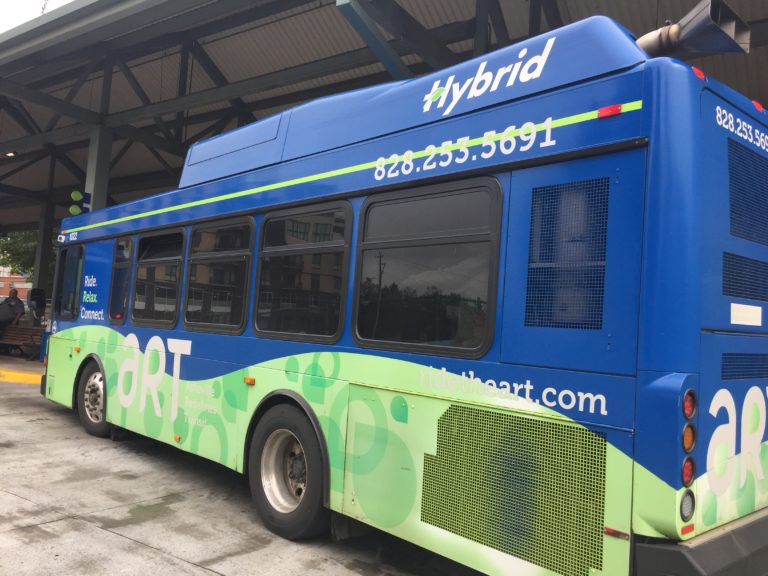The City of Asheville will buy seven new hybrid and diesel buses for the ART fleet, following Aug. 27 action by City Council to authorize their purchase.
In 2018, the City received $5.7 million in federal grant funds from the French Broad River Metropolitan Planning Organization to buy new transit buses. The City match for the grant funds was $1.4 million, providing a total budget of $7.1 million for bus procurement.
The City plans to buy buses with these funds over the next three years as part of the City’s rolling stock replacement schedule. This schedule considers the life cycle of each bus and when it will likely need to be replaced, the appropriate number of spare vehicles necessary, and upcoming and anticipated service expansions as outlined in the 2018 Transit Master Plan.
The new buses are needed to meet the schedule for timely implementation of the Transit Master Plan. The purchase of additional hybrid and vehicles will provide the needed fleet flexibility to meet system and on-time-performance needs.
Staff continues to evaluate the electric buses currently in service and to monitor the electric bus market for future fleet purchases. In June, the City put five Proterra electric buses into service, assigning them to routes that best match their range. Currently, the buses run on Routes S3, S6 and 170. Staff are evaluating other electric bus vendors for future incorporation into the fleet, as the technology evolves.
In the meantime, three new diesel-electric hybrid buses and four “clean” diesel buses are being added to the fleet. All reduce carbon emissions, in support of the City Council’s clean-energy and sustainability goals. “Clean” diesel is also known as ultra-low sulphur diesel (ULSD), has a reduced sulfur content, replacing the diesel of years past. Use of this fuel results in lower sulfur dioxide emissions and, consequently, lower environmental and health impacts.
Find the staff report to Council and related resolution at this link.
The City of Asheville will buy seven new hybrid and diesel buses for the ART fleet, following Aug. 27 action by City Council to authorize their purchase.
In 2018, the City received $5.7 million in federal grant funds from the French Broad River Metropolitan Planning Organization to buy new transit buses. The City match for the grant funds was $1.4 million, providing a total budget of $7.1 million for bus procurement.
The City plans to buy buses with these funds over the next three years as part of the City’s rolling stock replacement schedule. This schedule considers the life cycle of each bus and when it will likely need to be replaced, the appropriate number of spare vehicles necessary, and upcoming and anticipated service expansions as outlined in the 2018 Transit Master Plan.
The new buses are needed to meet the schedule for timely implementation of the Transit Master Plan. The purchase of additional hybrids and diesel vehicles will provide the needed fleet flexibility to meet system and on-time-performance needs.
Staff continues to evaluate the electric buses currently in service and to monitor the electric bus market for future fleet purchases. In June, the City put five Proterra electric buses into service, assigning them to routes that best match their range. Currently, the buses run on Routes S3, S6 and 170. Staff are evaluating other electric bus vendors for future incorporation into the fleet, as the technology evolves.
In the meantime, three new diesel-electric hybrid buses and four “clean” diesel buses are being added to the fleet. All reduce carbon emissions, in support of the City Council’s clean-energy and sustainability goals. “Clean” diesel is also known as ultra-low sulphur diesel (ULSD), has a reduced sulfur content, replacing the diesel of years past. Use of this fuel results in lower sulfur dioxide emissions and, consequently, lower environmental and health impacts.
Find the staff report to Council and related resolution at this link.
